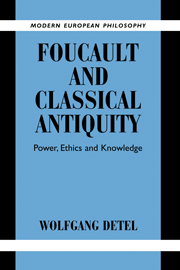6 - Gender, nature and reference
Summary
Foucault's analysis of ancient philosophical texts as well as the divergent interpretations that I have proposed in earlier chapters both make use of the distinction between the male and the female. But this distinction could refer to either biological sex or social gender. The relationship between the two, and a reference to biological sex differences, has long been the subject of heated controversy in feminist theory. This debate is not only of systematic interest, it also compels scholars who interpret ancient texts dealing with moral attitudes towards sexuality to reflect explicitly on the form of their historical reference to the male and the female.
The notion of gender would appear to be dependent on and relative to historical and cultural contexts and is therefore often assumed to be socially constructed. This means, however, that in historical studies, for instance on ancient culture, this notion cannot be applied without further qualification, in particular where such studies are intended to contribute to an understanding of historical attitudes towards sexuality, and thus more generally towards gender. Post-modern thought as influenced by Foucault has seen an increasing tendency to refer solely to the concept of social gender, and to brand any reference to biological sex as naive and patriarchal. Influential feminist approaches have interpreted Foucault in a manner that threatens to deprive his historical studies on sexuality of an important, if trivial, foundation – the reference to the sexes beyond cultural boundaries and specifications.
- Type
- Chapter
- Information
- Foucault and Classical AntiquityPower, Ethics and Knowledge, pp. 223 - 263Publisher: Cambridge University PressPrint publication year: 2005

